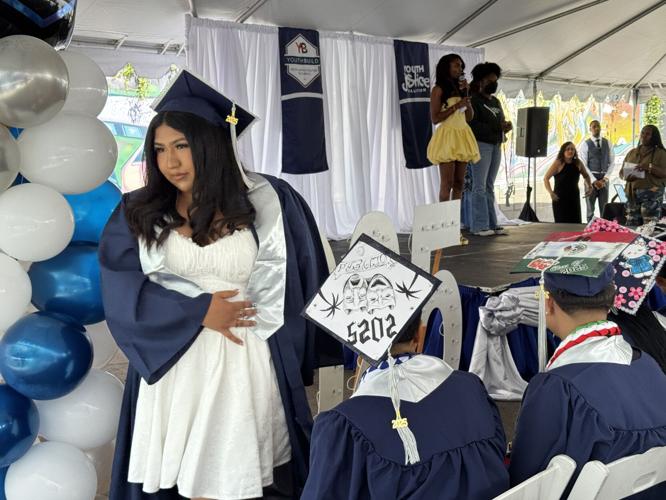
Once a place where young people were processed into the justice system, the building that now houses Chuco’s Justice Center in South Los Angeles became something different—a stage for the graduation ceremony of several students who had given up on graduating from high school.
“They took us in and treated us like family,” said graduate Natalie Segura, “They gave each one of us many chances to make it where we are now, they saw us grow and saw the best in us, and many encouraged us to do better.”
Segura is one of 21 students who graduated on Friday from the Youth Justice Coalition’s (YJC) Free LA High School, which stands for Fighting for the Revolution to Educate and Empower Los Angeles.
FREE LA High School is a two-year accredited high school diploma program designed to support youth ages 15 through 25 who are routinely pushed out of traditional schools due to incarceration, probation, gang injunctions, school discipline policies or simply for lacking stable housing.
“We come together today to celebrate our hard work, but also the journey that brought us here,” said Segura as she addressed a courtyard full of graduates and families. “I know a lot of youth who are graduating here who have been impacted by the system, a few of us are here for many reasons, one reason could be being pushed out of LAUSD (Los Angeles Unified School District) or other school districts.”
Segura, born and raised in South Los Angeles, was once a LAUSD student with a few run-ins with the law and a reputation that made school feel more like a jail sentence than a safe space.

More than a decade since LAUSD banned suspensions for “willful defiance” – the disrupting of school activities or willfully defying the valid authority of school staff – district data shows that Black and Latino students continue to face disproportionate disciplinary actions.
In the 2024 - 2025 school year, Black and Latino students were suspended at a rate of 0.9%, more than the rate of white and Latino students, who were suspended at 0.26% and 0.25%, respectively. Latino students lost the most class time: 2,733 days, compared with 812 for Black students and 270 for white students. Similar patterns were found in the previous two school years.
“What it is about LAUSD is that they will look for any excuse to kick out the kids or to drop them from school,” said Segura’s mother, Marlene Soto. “That was the trouble that I had with her.”
With a flower bouquet, graduation lei and colorful balloons in hand, Soto was one of many parents gathered to celebrate and see their graduates cross the stage. She reflected on the challenges her daughter had to live through, including a lengthy and challenging eviction from the home they lived in for 24 years.
“We went through a house eviction, and it scared me; it was one of the main reasons why I stopped going to school,” said Segura. “I would always tell my mom, I need to get a job, I need to help you, I’ll just drop out of high school. I panicked, especially since all my friends were graduating, and it made me feel so small and not successful.”
Asia Medley teaches English, Algebra, art, gardening and music industry training at Free LA High. On top of the core education, students are trained in community organizing, public speaking and activism, turning lived experience into power.

“We understand that everybody does not have the same opportunity, everybody does not have the same home life,” said Medley. “Some of those circumstances can prevent people from reaching where they are, so we want to not give up on those youth.”
Since 2019, YJC and FREE LA High are housed inside Chuco’s Justice Center – named after beloved youth organizer Jesse “Chuco” Becerra, who was gunned down in South L.A. in 2005.
For over two decades, the Youth Justice Coalition (YJC) has been at the forefront of advocating for the diversion of resources away from punitive measures.
FREE LA High is part of an approach called transformative justice, which seeks to remedy the harm of crimes to the victims and perpetrators within the community, while maintaining personal and community accountability and without causing more harm.
Long before diplomas were earned inside Chuco’s, the center served as the David V. Kenyon Juvenile Justice Center, where youth were sentenced and processed into the criminal justice system. All that ended when it closed in 2013.
“We still have the jail cells open in the back,” said FREE LA High School teacher Asia Medley. “Just so we can show people what this used to be, we took that and turned it into a school, so we intentionally turned a prison into a school to smash the school-to-prison pipeline.”
In April 2024, the L.A. County Probation Oversight Committee reported that mass incarceration has hurt Latino and Black youth, who make up 94% of detained juveniles in L.A. County. Latino youth make up 57% of the overall population.
The report also analyzed the origins of juvenile detainees, revealing that most of them came from low-income communities within L.A. County. The top five regions included South Los Angeles, Southeast Los Angeles County, Antelope Valley, the Harbor Area and Central Los Angeles.
According to the Center for Health Journalism, California spends roughly $179,400 per incarcerated youth annually, compared with $8,000 per student in public education—22 times more for punishment over schooling.
A 2015 California State University, Los Angeles study found that one in three youth released from probation in L.A. are re-arrested within a year.
“If I know my community and I know what they need and I know what the resources are, I know where to meet them,” said Medley. “I think more teachers should be community organizers so that they can not just focus so much on academia, but think about how academics can impact students for the rest of their lives.”
Segura will be enrolling at El Camino College and hopes to continue doing advocacy work for at-risk youth.
“Being able to graduate now made me realize that it’s never too late to graduate and get your high school diploma,” said Segura. “I now understand what’s going on around me, and I’ll be able to help other youth who have been traumatized by the [juvenile justice] system.”















(0) comments
Welcome to the discussion.
Log In
Keep it Clean. Please avoid obscene, vulgar, lewd, racist or sexually-oriented language.
PLEASE TURN OFF YOUR CAPS LOCK.
Don't Threaten. Threats of harming another person will not be tolerated.
Be Truthful. Don't knowingly lie about anyone or anything.
Be Nice. No racism, sexism or any sort of -ism that is degrading to another person.
Be Proactive. Use the 'Report' link on each comment to let us know of abusive posts.
Share with Us. We'd love to hear eyewitness accounts, the history behind an article.